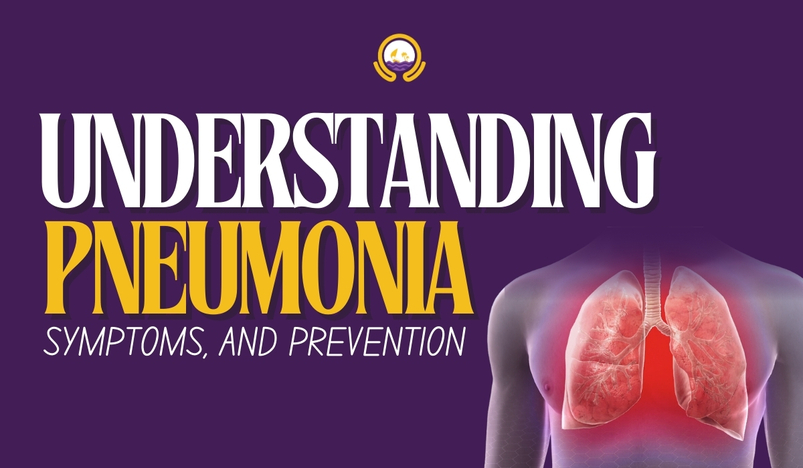
Pneumonia is a serious respiratory infection that can affect people of all ages, but it's especially dangerous for vulnerable groups, such as children under five, the elderly, and people with weakened immune systems.
Every year, pneumonia claims the lives of hundreds of thousands worldwide, making awareness, early detection, and prevention critical.
In Qatar, where respiratory health is impacted by factors such as climate, urban air quality, and high rates of respiratory infections, understanding pneumonia's causes, symptoms, and preventive measures is more important than ever.
Pneumonia is an infection that inflames the air sacs in one or both lungs, which may fill with fluid or pus, leading to coughing, fever, chills, and difficulty breathing.
The condition can be caused by various pathogens, including bacteria, viruses, and fungi. While bacterial pneumonia, especially the one caused by Streptococcus pneumoniae, is more common, viral pneumonia has gained attention due to its connection with viruses like influenza and COVID-19.
Pneumonia can develop from different sources, making it essential to know the risk factors to prevent it effectively. Common causes include:
Bacterial Infections
Bacteria such as Streptococcus pneumoniae are frequent causes of pneumonia, especially in young children and the elderly. Bacterial pneumonia is often more severe and requires prompt medical treatment.
Viral Infections
Viruses, including those that cause influenza and COVID-19, are also major contributors. Viral pneumonia tends to be less severe than bacterial types but can still cause significant complications, especially in people with compromised immune systems.
Fungal Infections
Fungal pneumonia is less common but can affect people with weakened immune systems, including those with chronic conditions or those on long-term medications that suppress immunity.
Poor air quality, exposure to dust, and smoking can increase the risk of developing pneumonia. In Qatar, the high frequency of sandstorms, combined with urban air pollution, can irritate the respiratory system and make it more susceptible to infections.
Symptoms of pneumonia can range from mild to severe, often resembling flu symptoms. Early recognition is crucial to ensure timely treatment and prevent complications. Key symptoms include:
Persistent Cough: A cough that produces phlegm or mucus is a common early sign.
High Fever and Chills: A sudden high fever, often accompanied by chills, may indicate an infection.
Shortness of Breath: Difficulty breathing, especially during simple activities, could signal pneumonia.
Chest Pain: Pain while breathing or coughing is a warning sign.
Fatigue and Weakness: General tiredness and low energy are common as the body fights the infection.
For some, particularly young children and the elderly, symptoms may be subtle or atypical, such as confusion, lower-than-normal body temperature, and low energy without the usual respiratory symptoms.
Detecting pneumonia early allows for more effective treatment and reduces the chances of severe complications. Here are some steps for early detection:
Routine Health Checks: Regular check-ups are crucial, especially for people at higher risk. In Qatar, regular doctor visits, particularly during flu season and sandstorm-heavy months, can help catch respiratory infections early.
Recognize Risk Factors: People with chronic respiratory conditions, such as asthma or chronic obstructive pulmonary disease (COPD), should be extra vigilant about symptoms. Qatar's high asthma rates underscore the need for heightened awareness in these groups.
Rapid Testing and Diagnosis: Advances in medical technology, including chest X-rays and blood tests, help doctors diagnose pneumonia quickly. Qatar’s modern healthcare facilities are equipped to provide rapid diagnostics, which is essential for effective treatment.
Preventing pneumonia starts with a proactive approach to health. Here are some key prevention tips:
Vaccination
Vaccines are one of the most effective ways to prevent pneumonia. Vaccines like the pneumococcal vaccine protect against bacterial pneumonia, while the flu vaccine can reduce viral pneumonia cases. Qatar's healthcare system encourages vaccinations, particularly for vulnerable groups such as children, the elderly, and those with chronic conditions.
Good Hygiene Practices
Washing hands regularly, wearing masks during flu season or high-pollution days, and avoiding close contact with sick individuals are essential practices, especially in densely populated urban areas.
Maintain Indoor Air Quality
Given the high temperatures in Qatar, many people spend long hours indoors. Using air purifiers and keeping homes well-ventilated can improve indoor air quality and reduce respiratory risks.
Stay Hydrated and Eat Nutritious Foods
Adequate hydration and a balanced diet boost the immune system, making it better equipped to fend off infections.
Regular Health Screenings
Qatar’s healthcare facilities offer preventive screenings, which can be vital in identifying respiratory vulnerabilities and allowing for preventive treatment.
In Qatar, the combination of high urbanization, dust from the desert climate, and population density in metropolitan areas can make respiratory illnesses more common.
Raising awareness about pneumonia, its causes, symptoms, and early detection is crucial for public health. World Pneumonia Day serves as a reminder of the impact of this illness and the steps we can all take to protect ourselves and our loved ones.
Understanding pneumonia, recognizing its symptoms, and seeking early medical help can make a significant difference in outcomes, especially in a setting like Qatar, where environmental and lifestyle factors may heighten risks.
Taking preventive measures, including vaccination, practicing good hygiene, and monitoring air quality, helps safeguard individual health and strengthens community resilience.
.jpg)
Qatar Secures Place Among the World's Top 10 Wealthiest Nations
.jpg)
Hamad International Airport Witnesses Record Increase in Passenger Traffic

Saudi Arabia: Any visa holder can now perform Umrah

What are Qatar's Labour Laws on Annual Leave?
Leave a comment